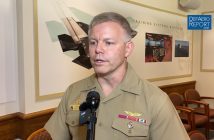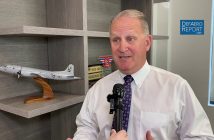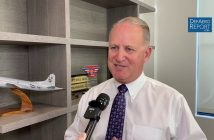Vice Adm. Paul Bennett, Royal Navy, NATO Allied Command Transformation’s chief of staff, discusses driving innovation, the command’s 13th annual Chiefs of Transformation Conference, capability development and more with Defense & Aerospace Report Editor Vago Muradian. Our coverage of the conference was sponsored by L3 Technologies and Leonardo DRS.
Royal Navy Vice Admiral Paul Bennett
Chief of Staff, Allied Command Transformation
NATO ACT Chiefs of Transformation Conference
Norfolk, Virginia
December 2018
Vago Muradian: Welcome to the Defense and Aerospace Report. I’m Vago Muradian here at NATO Allied Command Transformation’s Annual Chiefs of Transformation Conference in Norfolk, Virginia, the leading gathering of innovators from across the Atlantic alliance as well as from partner nations. Our coverage here is sponsored by L3 Technologies and Leonardo DRS.
We have with us Royal Navy Vice Admiral Paul Bennett who is the Chief of Staff here at Allied Command Transformation.
Sir, it’s an extraordinary conference. It’s a great end to the year, but also indicates what some of the key issues the alliance is going to talk about in the coming year are in terms of priorities. The mission of the command has been expanded to include capabilities development in a direct way.
From your standpoint, what are the key elements and the key messages you’re trying to transmit to all of these highly innovative people from across the alliance? And what are some of the things that you’re listening to them for as you shape the agenda for 2019? You, Admiral Nielson and of course General Lanata, the Supreme Allied Commander Transformation, are going to be shaping in the 2019 agenda?
Vice Admiral Paul Bennett: Well, General Lanata and I have arrived only a few months ago, but we’ve inherited this Chief of Transformation Conference which has been running for many years. An extraordinary collection of across the nations with different [problems], 50 nations with their Chiefs of Transformation coming together to share views, to wrestle with difficult subjects. And actually, I don’t think there is another vehicle in NATO or probably across most countries that allows that diversity of thought to come into one room to try and shape the alliance, but also partner nations for the future.
Mr. Muradian: There’s the young disruptors which are part of the event now, there are also some press interns as well. As you know, the command is also stepping up thinking about information disinformation as part of a hybrid. I know Colonel Blunt did a terrific job of that portion of the Trident Juncture Exercise as well.
From your standpoint, what are the keys to innovation? What are the keys to succeeding? Everybody always talks about moving faster, moving cheaper, and the importance of disruption. From your standpoint, what are some of the keys of harnessing that that goes beyond just the rhetoric of how great that sounds?
Vice Admiral Bennett: I think innovation is an oft-used term which I think we’ve got to analyze, we’ve got to get under the skin of, because otherwise I think people just say we should be innovative and it just doesn’t work.
So fundamentally, from my perspective, innovation is about having ideas. It’s collating ideas. It’s challenging ourselves to step into the future, to leave some of those perceptions that we’ve got and be challenged by all sorts of organizations or people in order that we can learn from each other and identify different futures which would lead to different options for the future.
So it’s about having ideas fundamentally. And of course then we take the next bit which probably you would refer to as entrepreneurship, but we’ll wrap it into innovation which is how to do you take those ideas and turn them into capability and put capabilities into the hands of the warfighter quickly.
So that’s the simple challenge of innovation. And I think if you start at the left hand end, which is this business about having ideas. How do you do that? Well, fundamentally you need to understand the challenges of the future. I think we do that really well. All nations, and certainly in ACT we describe what the problems are in the future. I think our challenge collectively is to take those problems and then figure out what we do about them. That’s where we have conferences like this or the NATO Industry Forum or the Concept Doctrine and Experimentation Forum where we bring experts from different countries together to explore what you’re thinking from your country’s perspective, and how when we put those together we might have a whole series of rich ideas.
So when you come back to this conference, we’ve got 50 nations, so that’s 50 different perspectives. We’ve got men and women from those countries, and civilians from various MODs. We’ve got this Young Disrupters Team, one from each of the countries that has a Chief of Transformation with the idea that we need those fresh, youthful views simply to add to that mix of perspectives. I think we step into the future through this conference with some confidence. Because I think if you can’t put all that together and come up with ideas that would allow us to take them forward, then I fear that there is no way that we’re going to come up with the ideas at all.
Mr. Muradian: The Deputy SACT, Admiral Nielson, Manfred Nielson, said that in a certain sense it may be good to get rid of X percentage of the staff here, like 30 percent or something like that, and replace them with young people. How important are the young disruptors as far as you’re concerned? Because military people tend to be a little bit conservative for some very good reasons at the end of the day. And even if the old is not working as well as it perhaps should, there’s a little bit of reluctance to jump to the next, even though militaries are remarkably innovative organizations at their core.
Talk to us about the role of the young disruptors and harnessing younger people to maybe have a different view of solving some problems that the community has struggled with for a very long time.
Vice Admiral Bennett: In any organization you need a mix of experience, because that experience is going to count because you need to really understand what is the art of the possible to be able to provide the context.
But then that experience needs to be challenged. That’s where the young disruptors, as many others, I mean there are lots of challenges here, but with the young disruptors we firmly believe, we’ve done quite a lot of work with youth but never had a young disruptors section in the conference. This is not the first time we have asked young people to come together and give us a challenge, but we haven’t done it in this form before.
But they come from their MODs, they come from civilian companies, they’ve been brought by their Chiefs of Transformation. They don’t come with the baggage of a long military career. They don’t come with the baggage of being bounced around in their Ministry of Defense and found out all the reasons why you can’t actually do something. I really hope that they come to us and challenge us with ideas that of course we might have had, but we didn’t dare say it because we think we wouldn’t be able to deliver it. And having it voiced, having it out in the forum and embracing those ideas will allow us, I hope, to grab some of those ideas and take them forward to the future.
Mr. Muradian: Oftentimes military, what’s interesting about this discussion and listening to the presentations as this sort of 13thCOTC conference gets underway, was how military people have been talking about some of these trends actually a little bit ahead of what some civilian leaders have been talking about. What’s the role of military folks to sort of better inform civilian leaders? Because folks talk about disruption, but with disruption comes taking risk.
For example, HMS Queen Elizabeth — and congratulations by the way, and the Prince of Wales will be in service here in a little bit — you know, really is a demonstration on how a nation can make some very, very hard choices to deliver capability. It’s a 72,000-ton ship that almost has the flight deck acreage of an American Nimitz Class carrier, but was accomplished for about $4 billion, 1500 in terms of crew, a significant amount of automation. Obviously not a nuclear ship. And some survivability tradeoffs were made, but at the end of the day the question was, can we deliver a moving four-acre flight deck that will be sovereign UK territory that goes around the world and is tailored to the aircraft you’re buying which was the F-35. What choices were made?
Talk to us about how military leaders can talk to civilian leaderships about making those kinds of difficult choices that yield capability either faster, cheaper, or ideally both?
Vice Admiral Bennett: There’s no right or wrong answer in most of the capabilities we provide. Nations will work really hard to get what they feel is the right value for the money, and you’re going to trade off resilience for flexibility, and you’re going to trade off manpower for automation and there’s a tradeoff there. Every nation will determine how that works.
From the UK perspective, we’re enormously proud of Queen Elizabeth and the Prince of Wales. She’s worked very well in her early trials — better than we could have hoped. And that investment in automation, investment in new ideas has been very positive.
But to come back to your particular question, the military provide advice to the politicians. That’s our job. Politicians will tell us whether we’re going to go to war or not, and the conflicts we should fight, and the influence of the deterrence we should provide. The military provide advice, and we also provide advice about where we should spend defense money in all our nations, and from ACT’s perspective, we’ll work with Brussels headquarters to determine where we spent NATO money on capability.
But it has to be military advice and then it’s then laid on the politicians’ table to determine what we think is the appropriate outcome of that.
That relationship is, of course, embedded in every nation. It’s entirely part of our democratic process and we would have it no other way. The real challenge for us, especially as we look into the future where there’s a lot of different options, is that we’re able to be as articulate and accurate as we can, recognizing the uncertainty that we present. So if we’re going to invest in new technology there is going to be an element of risk in that, partly through where that technology is going to work, but partly whether that technology will be as relevant as we hope it will in 10 or 15 years. We don’t know that. But that’s the military advice, and that’s the dialogue and the discussion that we will have from ACT’s perspective, with Brussels.
Mr. Muradian: Vice Admiral Paul Bennett, Royal Navy, the Chief of Staff here at NATO’s Allied Command Transformation, Norfolk. Sir, thanks very much. I hope you have a very good holiday and a good year, and I look forward to engaging with you in 2019 which will be the 70thanniversary year of the alliance.
Vice Admiral Bennett: Very exciting. My pleasure. Thanks, very much indeed.
30




